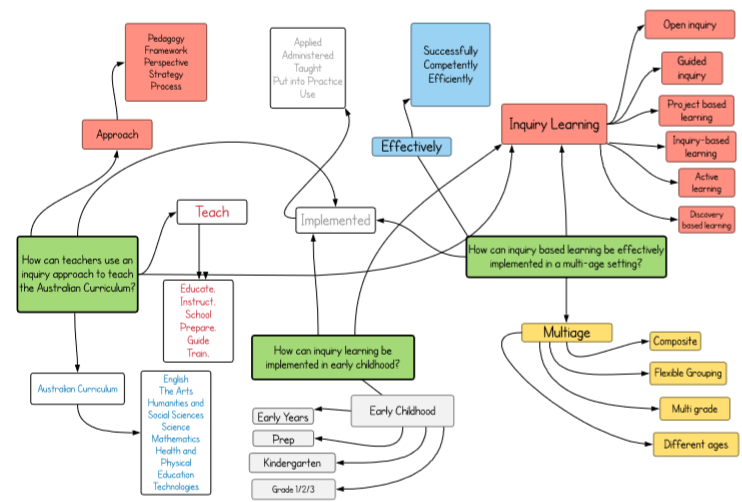It feels like I have been part of the education system in Queensland for my entire life. Like so many before me, I went straight from high school into my Bachelor of Education (Early Childhood) and began my teaching career the very next year after graduation. I started teaching in Kindergarten, then junior secondary, followed by upper primary then (finally) back down to the early years. Since embarking on my teaching journey, I have always worked in rural Queensland and as cliché as it sounds, fell in love with a farmer. 12 years and 3 beautiful children later, I still live and teach in rural QLD.
As rural schools are so small, multi age classrooms have been my only teaching experience and I wouldn’t have it any other way. The diversity and richness that comes with a range of ages is a challenge worth meeting! I have been a Teaching Principal in a small P – 6 school for the last three years and am currently working in an advisory role in regional office. Learning to teach across prep to year six in one classroom was a sharp bend in the road and made me critically reflect on effective multi-age pedagogy.
With a passion for learning and providing the best educational experiences and support for bush children, I started undertaking my Masters in Inclusive Education last year. I am passionate about rural education and believe that all children irrespective of their location deserve to be educated by high quality teachers. To maintain high standards and professional knowledge, teachers need to be continually on a learning journey. To develop my own teaching practices, I have gone right outside my comfort zone and chosen Inquiry Learning as an elective this year. To say this subject has been a big learning curve for me is an understatement! With many tears and tantrums, I was able to make this inquiry blog a reality!
My current understanding of inquiry learning is that it is a student driven, questioning style of learning. It involves developing knowledge and understanding through research, fact finding and information gathering then using that information to find an answer or solution. I have engaged my students in some student led inquiry learning experiences however more often than not, I have used the teacher led model of inquiry in my classroom practices. I would like to build my knowledge of Inquiry Learning and the different teaching models so I can use it more effectively in my planning. How can I utilise Inquiry Learning to better support the students in my multi-age classroom? How can I support the teachers in my school to effectively use inquiry learning in the early years?
Through this blog, you will follow me on my inquiry journey into the following initial search questions.
1. How can inquiry learning be effectively implemented in a multi-age setting?
2. How can inquiry learning be implemented in early childhood?
3. How can teachers use an inquiry approach to teach the Australian Curriculum?
See below my mind map to start my searching journey.

Stay tuned while I navigate my way along this long and winding inquiry journey!
Tanya
Hi Tanya,
How inspirational your initial blog post is. Having attended a small rural primary school myself it is heartening to hear educators speak passionately about delivering high quality education and experiences to children, irrespective of their location. Your current position as a principal relates directly to my guided inquiry focus question. I see the principal as being the essential ingredient to effectively drive positive change in educational pedagogy toward an inquiry-based learning approach. You are leading from the front with your passion and drive to implement inquiry learning, not just in your classroom but in your school. As with many rural schools, classrooms are often multi-aged and, as you have discovered, inquiry learning is an ideal tool to use for differentiated learning.
As inquiry learning tends to be technology driven, providing all schools have adequate access to the internet and web tools, inquiry learning could indeed be the great equalizer in developing lifelong learners.
Having read the first page I am intrigued to read the remainder of your blog and see where your journey takes you.
LikeLike
Thanks Christine. You are right, technology in rural schools can be a big barrier and one that I have met frequently! Being a creative problem solver and very flexible have been key skills for me to develop.
LikeLike
Tanya, from reading this, I really get a sense of where you are coming from. Your introduction clearly sets the stage for a realistic journey into inquiry learning. Furthermore, your inquiry questions stay very true to your teaching situation. Your mind map is very extensive, with a wide range of search strings. It is clear that you will be able to use these search strings to conduct thorough research into your questions. I really like how your questions have started off broad, allowing room for refinement once you find out more information as you navigate “the long and winding road”. It would be great to throw in a couple more sentences throughout (maybe at the beginning and in between, linking your journey to the metaphor like you have done at the end. Also, just for a clean finish, it would look good if your alignment was justified and you left a line between paragraphs. I completely connected with your journey and metaphor! You should be really proud of yourself. Great job.
LikeLike
Thank you! I agree the alignment needs to be justified and more spacing. Going to take your advice and try to link my metaphor in throughout.
LikeLike